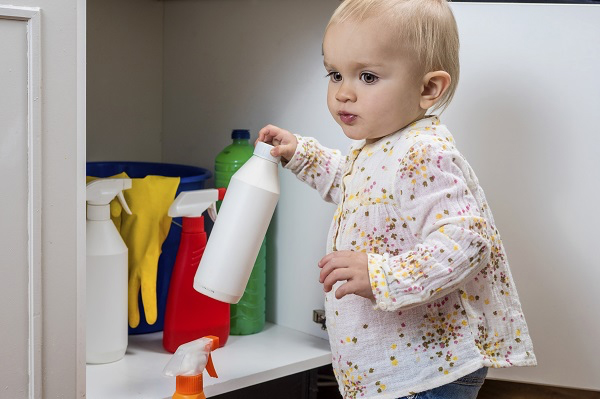Protecting your child from household chemicals
Over 1 million children swallow or have contact with a poisonous substance each year. It is important for caregivers, parents and grandparents to know what and what not to do in the event that a child has come into contact with or ingested a household chemical.
If a child ingests a poisonous substance, do not give the child water to drink, force the child to vomit or administer syrup of ipecac. Instead, have the child spit out any remaining substance, and call 911 or your local emergency number immediately. You can also call the Poison Help number at 1-800-222-1222.
If a child has been exposed to poisonous fumes, he/she should be taken into fresh air immediately. Call 911 and begin CPR if the child has stopped breathing.
If a child has swallowed a button cell battery, seek treatment in a hospital emergency department immediately.
If a child‘s skin or eyes have come into contact with a poisonous substance, they should be rinsed for 15 minutes. Hold the child’s eyelid open and pour a steady stream of room temperature water into the inner corner of the child’s eye or across the affected area.
The best prescription for childhood accidents is prevention. The American Academy of Pediatrics recommends the following guidelines to help poison-proof your home:
- Store medicine, cleaning and laundry products, including detergent packets, paints and varnishes, pesticides and any other dangerous substances in their original packaging in locked cabinets or containers, out of sight and reach of children.
- Never place poisonous products in familiar food or drink containers.
- Safety latches that automatically lock when you close a cabinet door can help keep children away from dangerous products, but there is always a chance the device will malfunction. The safest place to store poisonous products is where a child can’t reach.
- Purchase and keep all medicines in containers with safety caps and keep out of reach of children. Discard unused medication. Take note that safety caps are designed to be child-resistant, not childproof.
- Never refer to medicine as “candy” or any other appealing name.
- Check the label each time you give a child medicine to ensure proper dosage. For liquid medicines, use the dosing device that came with the medicine.
- If you use an e-cigarette, keep the liquid nicotine refills locked up out of children’s reach and only buy refills that use child resistant packaging. Ingestion or skin exposure with just a small amount of the liquid can be fatal to a child.
- Keep coal, wood or kerosene stoves in safe working order.
- Maintain working smoke and carbon monoxide detectors.
- Secure remote controls, key fobs, greeting cards and musical children’s books. These and other devices may contain small button cell batteries that can cause severe injury if ingested.
At Children’s Hospital of Georgia, we have an emergency department specifically tailored to fit the needs of children. Our pediatric emergency department serves over 28,000 pediatric patients each year.
For more information on the services offered at CHOG’s pediatric emergency department, call 706-721-7337 (PEDS) or visit our website at augustahealth.org/chog
Source: American Academy of Pediatrics




